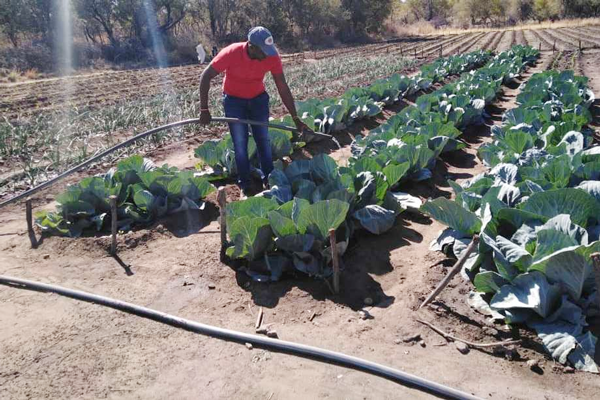

BY RICHARD MUPONDE
OWEN Sibanda’s childhood was typical of thousands that grow up in Tsholotsho, one of the poorest districts in Matabeleland South province.
He walked at least 18km to and from school every day and never imagined any bright future in Zimbabwe because all he saw around him was poverty.
For Sibanda, like many youth growing up in Tsholotsho, the only escape route was migrating to South Africa or Botswana for so-called greener pastures.
Fortunately for him the sojourn to South Africa paid dividends as he is now a very successful businessman.
He is the founder of M M Trading, a fleet management company with operations in all provinces in South Africa, except KwaZulu Natal.
Sibanda (40) has now bucked the trend by investing massively in Tsholotsho so that future generations do not have to endure the struggles he faced growing up.
This was after a realisation that most people from Tsholotsho that became successful chose to invest in already fairly developed places like Bulawayo.
- Chamisa under fire over US$120K donation
- Mavhunga puts DeMbare into Chibuku quarterfinals
- Pension funds bet on Cabora Bassa oilfields
- Councils defy govt fire tender directive
Keep Reading
“I was born 40 years ago in the Dokwe area in ward 16 to Toto Sibanda and Lillian Ndlovu,” he said.
“I grew up there and went to Dokwe Primary School and Maqekeni Secondary School, which were 9km away from home.
“I grew up in a very poor family, in a deep rural set-up and we didn’t know anything about electricity or television.”
Sibanda moved to South Africa in 1996 and would only return home during public holidays.
His flagship investment back home is a potentially five-star lodge, which is nearing completion at the dusty Tsholotsho business centre.
Sibanda’s vision is to turn Tsholotsho, which borders the world-famous Hwange National Park, into a tourist hub.
He has laid out plans to move tourists from the Joshua Mqabuko Nkomo International Airport in Bulawayo to Tsholotsho — a distance of about 117km.
Packages the lodge will offer include game drives to the national park and trips to Victoria Falls.
The ambitious businessman has already turned an 18-hectare plot about 8km from Tsholotsho business centre, into a thriving agriculture project.
On the plot Sibanda is into goat rearing, piggery, beekeeping, fish farming and poultry projects.
He envisages that most of the produce would be consumed at the lodge that will be complete by December.
Sibanda also constructed a dam on the plot and wants to introduce horse rides, quad bike rides and paint bowling.
Once complete, the project will employ hundreds of people from the local community.
Sibanda has also built a modern homestead that has three solar-boreholes to support another horticultural project.
He currently grows vegetables such as cabbages, tomatoes, onions, beetroot, and an orchard with over 100 mixed fruit trees.
He has 100 head of cattle kept at the Forestry Commission’s Nsezi farm, which is a stone’s throw from his homestead.
Sibanda has also set up a recording studio at his homestead, which is home to chart-topping Masgandi group Amaganyane.
Amaganyane’s music is being fine-tuned by top producer Clarence Garura,who doubles as Sibanda’s CEO.
Sibanda said he was embarking on the projects as a way of paying tribute to his father, Toto, who was passionate about the development of Tsholotsho.
He says he has sunk a staggering US$1,5 million into the projects.
Toto, a prominent politician in his time, was instrumental in the construction of Mathula Secondary School.
Sibanda said he wants to play a role in Tsholotsho’s quest for a town status.
“I saw that Tsholotsho didn’t have decent accommodation facilities and people would go as far as Bulawayo to spend a night,” he said. “I decided to set up a world-standard lodge,which can also accommodate international guests.”
Sibanda said after realising that securing food for his guests would be a challenge, he decided to venture into agriculture projects.
After identifying the land, he sought necessary approval from the local authority, the Environment Management Agency and the Agriculture ministry, among other agencies.
Sibanda, however, said the success of his venture was being threatened by a greedy and jealous local politician, who started throwing spanners into the works.
“After the council gave me the land, there was a gentleman, now a councillor, but I can’t name him at this stage, who approached me seeking a bribe,” he said.
“He said I should give him money for protection and also use his tractor, but I refused.”
Sibanda said the politician mobilised traditional leaders against him and after a week, Chief Magama ordered his eviction. Early this year the local authority also sought his eviction.
“This is the same council, which pegged the land for me and I am paying rates,” he said.
“The person, who wanted a bribe from me crossed from the opposition to Zanu PF and is now a councillor. He is the person now using council to try and evict me.”
Sibanda said on the day he won a court case nullifying Chief Magama’s eviction order, he found his homestead on fire.
He said 120 villagers torched his chalets and in the process the businessman lost property worth $30 000.
The villagers were arrested, but Sibanda withdrew the charges against them saying they were mere pawns.
Some villagers such as Timon Nkomo believe Sibanda’s projects have transformed their village.
“I was living at my parents’ homestead, but now I have managed to build my own homestead after I started working for him,” he said.
“This man has transformed this area and improved our lives.”
Henrick Tshuma, another villager, said he had acquired a lot of knowledge from Sibanda’s farming activities.
Sibanda said he was not deterred by the legal battles between him and the Tsholotsho council, which are threatening to derail his investments.










